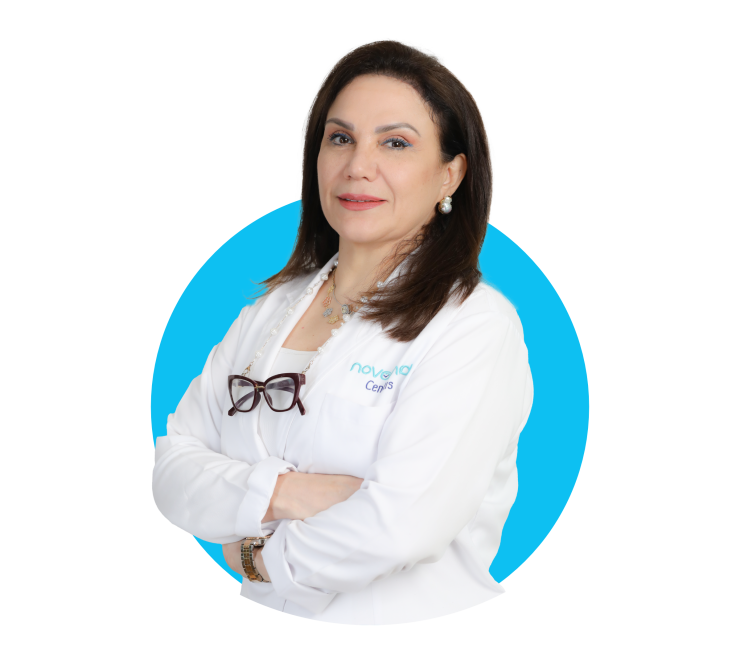Esophageal Disorders Treatment in Dubai
Overview
The esophagus, or food pipe, is the muscle that transports food and liquids from the mouth to the stomach. It is possible to be unaware of your esophagus until you consume something that is too huge, too hot, or too cold.
Esophageal disorders are a group of diseases that affect your esophagus functioning system. These might range from common illnesses like gastroesophageal reflux disease (GERD) to swallowing and motility issues and even rare, difficult-to-diagnose conditions.
Novomed gastroenterologists have extensive experience treating different esophageal abnormalities and providing advanced diagnostic and therapeutic options to patients of all ages.
Types of esophagus disorders
We combine highly developed diagnostic techniques with cutting-edge imaging methods and testing to treat esophageal disorders. We use a minimally invasive strategy with an integrated and thorough approach to treating a range of conditions, such as:
- Gastroesophageal reflux disease (GERD): often known as acid reflux, GERD occurs when stomach acid runs back up into the esophagus. Symptoms include a sour or acidic taste in the mouth, heartburn, chest pain, trouble swallowing, and a hoarse voice.
- Achalasia develops when the sphincter muscle at the base of the esophagus fails to open or relax correctly, making it difficult for food or fluids to enter the stomach.
- Barrett’s esophagus: a disorder that typically affects long-term GERD patients. As stomach acids continue to back up from the stomach into the esophagus over time, they can erode the esophageal wall and cause tissue damage. Barrett’s esophagus patients are more likely to develop esophageal cancer.
- Eosinophilic gastroenteritis: a rare disorder characterized by a high concentration of eosinophils, a type of white blood cell, in the GI tract and bloodstream. This disorder is more prevalent in patients who suffer from several allergies and causes inflammation, swelling, and food allergy symptoms like nausea, vomiting, and abdominal discomfort.
- Esophageal cancer is a tumor that develops in the esophagus, typically in the inner-lining cells.
- Esophageal diverticulum: An outpouching develops within a weak esophageal area. Achalasia increases the risk of getting diverticula.
- Esophageal spasms: This condition causes abnormal esophagus muscular spasms (contractions) that prevent food from reaching the stomach.
- Esophageal strictures: A disease where the esophagus narrows excessively, slowing down the transportation of foods and drinks into the stomach.
- Hiatal hernias: This condition occurs when the top part of the stomach bulges through the diaphragm and settles in the chest, causing additional acid reflux.
- Swallowing and motility disorders: People who frequently gag, choke, or have difficulty swallowing require specialized care from physicians who can diagnose the underlying reason and prescribe effective treatment.
Symptoms of esophageal disorders
You may experience different symptoms or signs based on the esophageal disorder you have.
- Abdominal, chest, or back ache.
- A persistent cough or sore throat.
- Swallowing difficulties or feeling as if food is trapped in the throat.
- Recurrent heartburn
- Hoarseness or wheezing
- Indigestion (burning feeling in your stomach).
- Vomiting or regurgitation (acid or stomach contents traveling back up the esophagus to the mouth).
- Unexpected weight loss.
Esophageal disorders treatment
From injections to minimally invasive surgery, we identify the treatment that suits your needs and medical goals.
- Medication
Medications are frequently combined with lifestyle changes to manage GERD symptoms, such as heartburn. Your physician may recommend that you initially try over-the-counter acid-controlling drugs. If these don’t work, they may prescribe acid-reducing H-2-receptor blockers or proton pump inhibitors (which block acid production and help heal the esophagus).
- Muscle Injection
Our team uses an endoscope to inject a solution into the esophageal sphincter during this outpatient surgery. This injection causes temporary muscle paralysis, alleviating Achalasia symptoms and other swallowing difficulties.
- Esophageal balloon dilation
Esophageal balloon dilation is a technique that allows your doctor to enlarge a constricted part of your esophagus using a balloon attached to an endoscope. When inflated, the balloon extends the too-narrow part of the esophagus. Dilation can alleviate swallowing difficulties and severe heartburn symptoms.
- Peroral Endoscopic Myotomy (POEM)
At Novomed, we use endoscopies to identify and treat esophageal disorders innovatively. A flexible scope equipped with a camera is inserted through the mouth and into the esophagus. The scope’s photos enable our staff to identify if you have an esophageal disorder. We can also attach surgical instruments to the endoscope to perform many non-invasive procedures.
- Fundoplication (Laparoscopic antireflux surgery)
Fundoplication surgery treats gastroesophageal reflux disease (GERD) and Hiatal hernias. During a laparoscopic fundoplication, the top part of the stomach is tied around the end of the esophagus using minimally invasive instruments. The knot stops stomach acid from backing up into the esophagus, alleviating GERD symptoms.
- TIF Procedure
Transoral incisionless fundoplication (TIF) is an advanced endoscopic surgery that relieves acid reflux (heartburn) symptoms associated with gastroesophageal reflux disease (GERD). The physician inserts the endoscope through customized TIF equipment that allows the physician to restore or reconstruct the body’s natural barrier against reflux. It employs forceps (tweezers) and fasteners that are preloaded and requires no incision.
- Cryoablation (cryotherapy)
Thie method is often employed to treat Barrett’s esophagus or esophageal cancer in its early stages. A liquid nitrogen spray is utilized during the surgery to freeze and destroy precancerous or cancerous tumors in the esophagus.
Esophageal disorders can be complicated and necessitate treatment by specialists well-versed in the most recent research-based treatments.
Our multidisciplinary team combines technological expertise with breadth and depth of knowledge in all esophageal-related fields. In addition to gastroenterologists and certified surgeons, our team at Novomed consists of oncologists, radiologists, otolaryngologists, pulmonologists, and speech and physical therapists.
Schedule an appointment to learn more about our services by calling the toll-free number 800 (NOVO) 6686 or filling out the booking form below.

